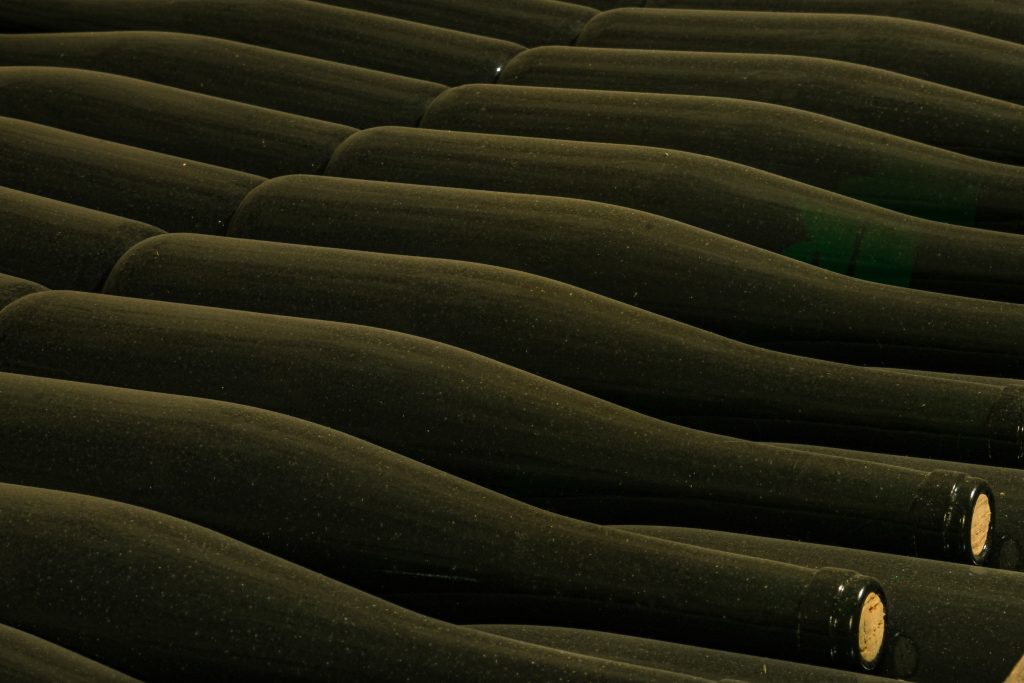There is something to be said for it: reduce the price by purchasing volumes so wines can also be budgeted for the average bon vivant.
Or is it just leftovers and inferior products that no one would buy if they could be tasted beforehand?
Without wishing to refer to any well-known movie, but of course it is not so black and white. We could speak of variations of gray, even shades.
An important factor that I like to put first: enjoying wine is related to your taste, your appetite, your preference. Not to the price or the name on the label! You can buy a car based on how it looks or what brand is on the back, because everyone can see you driving by. But if you have to buy a certain bottle of wine because someone else would be impressed, even just in front of or behind you at the cash register… Then you have a problem, if not with yourself, then sooner or later with your wallet.
I cannot substantiate it with proven figures, but I think more than half of all wine in Flanders is bought in the supermarket. Lower quantities at once than in the specialist store, but many, many more customers who take one or a few bottles with them. And that wine costs no more than ten euros in three quarters of the purchases. I think…

As with the informative wine merchant, you will have to taste to find the supermarket wines that appeal to you and that also fit your budget. The wine merchant will more readily have something to taste: a specific wine that he is promoting or a tasting with various wines. He may introduce you to the winemaker himself at that tasting, or provide a gadget such as a corkscrew. The supermarket doesn't do that. And it does not include those costs.
Do you sometimes order your wine online from the producer? Then the shipping cost is quite high. And that also determines the price. The wine merchant orders a number of pallets, transport costs are lower per bottle. The supermarkets buy a few trucks of wine and bottle it overhere themselves. For a fraction of the transport cost, again compared per unit.
That explains part of the cost. Just like the fixed costs that can be settled on a larger volume by a larger organization.
Look, if you want to tell something useful as a wine merchant, you have to delve into it. Preferably, if only for the sake of credibility, go talk to the man in the vineyard. In the supermarket, someone collects this information and passes it on to his numerous colleagues, who take it over and see a multitude of customers together.
If the supermarket customer asks a question at all, because how often do you see a person appeal to an employee of the grocery store, to ask for the better wine for the occasion? Not very often, do you? So they put limited information on labels, for each of the wines.
And it doesn't pay off to open a seven euro bottle to have it tasted: whatever it costs, you can only wring six glasses (or twelve sample quantities) out of the bottle. So that will be more profitable with a fifteen euro wine…
And does the average supermarket wine buyer want to taste under the watchful eye of a store employee and at the risk that the neighbor passes by and asks if that wine is ok? No. He does the tasting at home, without curious people around.
Rest assured that the producers also know the potential of the supermarkets. If the volume permits it, they will always make quality wine for the specialized trade and also simple "everyone's friend"-wine, for the supermarket and at the right price to appeal to that audience as well.
So whichever way you look at it: the price is actually always correct, it is the consumer who determines it. Because of his or her expectations.
Quickly grabbing a bottle without fuss, possibly based on the nice label and the price?
Or discuss it, taste it, gather information, check the harvest year, keep food pairing in mind, but also the company that will join the drink…
Two different worlds, both perfectly defensible, both with a different supplier.

On the other hand, there are unavoidable doubts about large supermarket wine producers who deliver the same quality wine year after year, as if it were cola.
You see, you get what you pay for. And I don't want to feed all the people who are perfectly happy with such wine. I don't even want to shake hands with them all. There are too many of them....
If you buy a "solid" red wine for six euros, there is a chance that that wine has been chaptalized (sugar added to manipulate taste and alcohol percentage). So be it. And if we are honest (always…): there is no other way.
If you don't want that, it's better to buy a thick wine for fifteen euros from a specialized wine merchant who knows the makers of his wines personally and how they work. Value for money, remember?
But in the end you have wine in all tastes, in all price ranges, in all qualities and you choose yourself. Luxury problem?
Nothing wrong with wine from the supermarket! Not even if you have a cellar full of Bordeaux and Barolo. Gives you the chance to open a bottle without hurting your wallet…
de wijnproever

